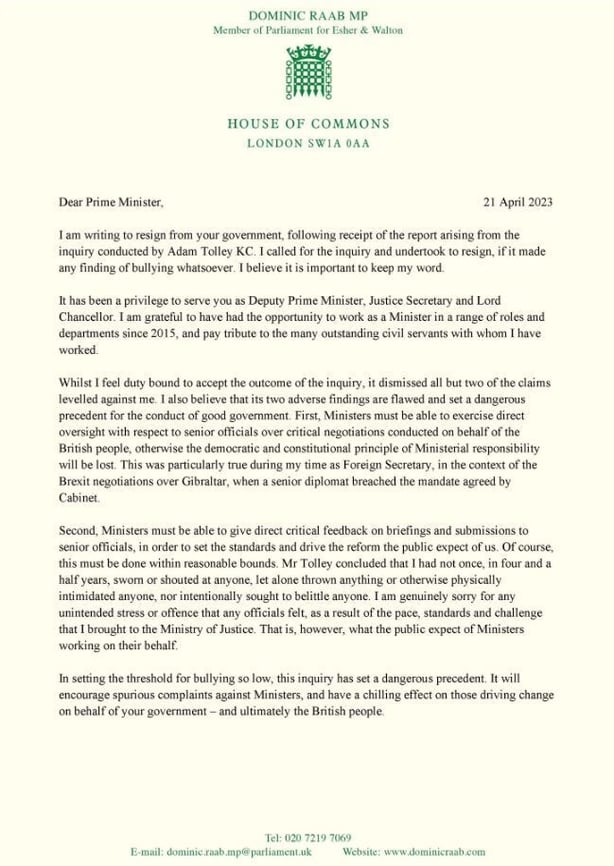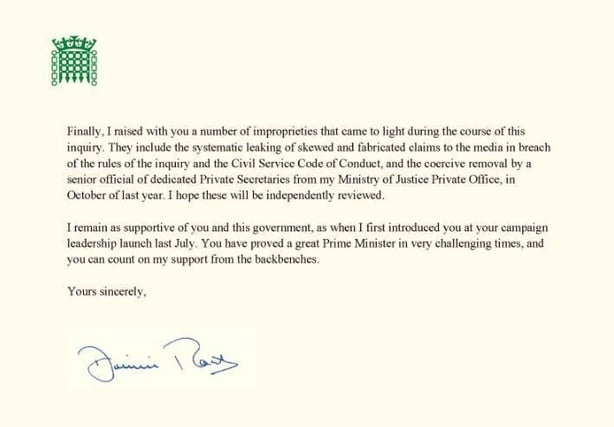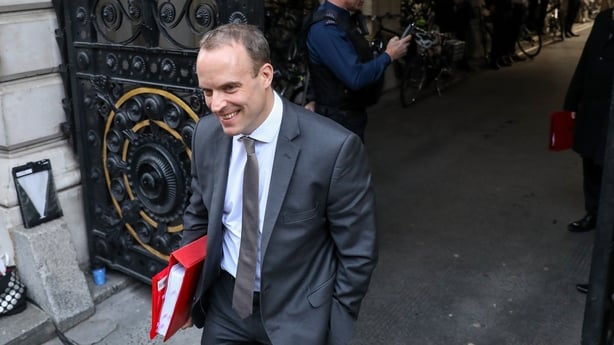British Deputy Prime Minister Dominic Raab has resigned from government following an independent investigation into complaints that he bullied colleagues, the latest scandal to force out one of Prime Minister Rishi Sunak's top ministers.
The departure of the third senior minister over their personal conduct in the last six months will damage Mr Sunak's efforts to revive the governing Conservative Party's fortunes and is a major embarrassment as he had entered Downing Street in October promising a government of integrity.
Mr Raab's resignation comes just two weeks ahead of English local council elections where Mr Sunak's Conservatives are predicted to fare badly.
It will also do little to improve the public perception of his government following the scandal-ridden tenure of Boris Johnson and the chaotic economic policies that brought down Liz Truss after less than two months.
The months-long investigation into Mr Raab's behaviour heard evidence from multiple government officials about complaints of bullying at three different departments.
Mr Raab who requested the investigation in November following formal complaints about his behaviour by government officials, said he felt "duty bound" to accept the outcome of the inquiry but also staunchly defended his conduct.
He said the report had concluded he had not once sworn, shouted or physically intimidated anyone in four and a half years, and had dismissed all but two of the claims against him.
Mr Raab said: "Setting the threshold for bullying so low set a dangerous precedent for the conduct of good government."
This will "have a chilling effect on those driving change on behalf of your government - and ultimately the British people", he said in his resignation letter to the prime minister.
Mr Sunak said he had accepted Mr Raab's resignation with "great sadness".
In a letter to Mr Raab, he added: "But it is clear that there have been shortcomings in the historic process that have negatively affected everyone involved. We should learn from this how to better handle such matters in future."
Read more
Raab returns to backbenches after colourful career


In his letter, Mr Raab wrote: "Whilst I feel duty bound to accept the outcome of the inquiry, it dismissed all but two of the claims levelled against me. I also believe that its two adverse findings are flawed and set a dangerous precedent for the conduct of good government.
"Ministers must be able to exercise direct oversight with respect to senior officials over critical negotiations conducted on behalf of the British people, otherwise the democratic and constitutional principle of ministerial responsibility will be lost.
"Ministers must be able to give direct critical feedback on briefings and submissions to senior officials, in order to set the standards and drive the reform the public expect of us. Of course, this must be done within reasonable bounds.
"Mr Tolley concluded that I had not once, in four and a half years, sworn or shouted at anyone, let alone thrown anything or otherwise physically intimidated anyone, nor intentionally sought to belittle anyone.
"I am genuinely sorry for any unintended stress or offence that any officials felt, as a result of the pace, standards and challenge that I brought to the Ministry of Justice. That is, however, what the public expect of ministers working on their behalf."
"In setting the threshold for bullying so low, this inquiry has set a dangerous precedent. It will encourage spurious complaints against ministers, and have a chilling effect on those driving change on behalf of your government - and ultimately the British people."
Another of Mr Sunak's senior ministers, Gavin Williamson, was forced to resign in November after bullying allegations, and the prime minister sacked Conservative Party chair Nadhim Zahawi in January after he was found to have broken the ministerial code over his openness about his tax affairs.
Mr Sunak is facing his own investigation by parliament's standards watchdog into his behaviour over whether he properly declared his wife's shareholding in a childcare company which stands to benefit from new government policy.
Raab described work of officials as 'useless'
A total of 44 pieces of written evidence and 766 interviews were taken into consideration by senior lawyer Adam Tolley, the report said.
Mr Raab was interviewed four times over the space of around two-and-a-half days and engaged "seriously and conscientiously in the process", Mr Tolley said.
In his findings on a complaint into Mr Raab's conduct as foreign secretary, Mr Tolley wrote: "In reaching and implementing this management choice he acted in a way which was intimidating, in the sense of unreasonably and persistently aggressive conduct in the context of a work meeting.
"It also involved an abuse or misuse of power in a way that undermines or humiliates. He introduced an unwarranted punitive element."
On a separate occasion while foreign secretary, Mr Raab was found to have caused a "significant adverse effect" on a civil servant after conveying a threat.

Mr Tolley wrote that he referred to the civil service code in a way that would reasonably have been understood as suggesting those involved had committed a breach.
"This had a significant adverse effect on a particular individual who took it seriously. The DPM's (deputy prime minister) conduct was a form of intimidating behaviour, in the sense of conveying a threat of unspecified disciplinary action, and was experienced as such.
"He did not target any individual, nor intend to threaten anyone with disciplinary action. However, he ought to have realised that his reference to the Civil Service Code could well have been understood as a threat."
Mr Raab was found to have described the work of officials as "utterly useless" and "woeful" while he was justice secretary.
Mr Tolley praised the UK Ministry of Justice complainants' "courage" for coming forward with allegations that launched the inquiry.
Though he did not make any formal findings about Mr Raab's conduct in relation to these claims, Mr Tolley did say Mr Raab acted in an "intimidating" manner at meetings with policy officials.
He also made "unconstructive critical comments" about the quality of work they did.
"By way of example, he complained about the absence of what he referred to as 'basic information' or 'the basics', about 'obstructiveness' on the part of officials whom he perceived to be resistant to his policies, and described some work as 'utterly useless' and 'woeful'," Mr Tolley wrote.
